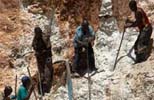
In a ceremony at the Rwandan border town of Gisenyi last week officials handed over 90 metric tons of smuggled minerals to the Congolese authorities. The minerals—mostly tin and coltan—were seized by the Rwandan police and were identified as having illegally originated from Congo’s conflict ravaged east.
Meanwhile, just across the border in the Congolese city of Goma callers to a local radio show debated the significance of the mineral exchange.
While some reports have viewed the smuggled mineral return as a sign of improvement in the often tenuous relationship between the two countries, many Congolese remain skeptical about the intentions of the Rwandan government. The Rwandan army has invaded the eastern Congo at least twice in the last two decades, and there is strong evidence of their involvement in the looting of Congo’s vast mineral wealth.
During the debate on the Goma radio show, most callers expressed the belief that if Rwanda is genuinely interested in improving Rwandan-Congolese relations the government and police need to do more to stop the continued illegal exploitation of Congolese mineral wealth. In fact, even as officials from the two countries celebrated the mineral exchange, Congolese customs officers caught 42 bags of minerals—each weighing 50 kgs—being smuggled across the border in a Rwandan registered Jeep.
But Rwandan officials are adamant about their country’s commitment to cleaning up mineral supply chains. Rwanda’s deputy director of natural resources, Michael Biryabarema, stated, “We have begun the process to end speculation that the Rwandan government is interested in conflict mineral business from Congo.”
Congolese mining authorities have cited the recent U.S. legislation as a catalyst for change in the Great Lakes. Paul Yenga Mabolia, the head of Promines, a World Bank program assisting Congo’s mining sector spoke about the transformation Section 1502 of the Dodd-Frank Wall Street Reform and Consumer Protection Act has brought to the region. The law has “changed the spirit and mentality of people. They know they have to go through the system and have their minerals traced and tagged.”
But for the Congolese people, doubts remain as to Rwanda’s sincerity. As some of the callers to the radio show indicated, many observers believe the return of the smuggled minerals is more of a symbolic gesture for the outside world’s consumption. Without external pressure, they doubt Rwanda would be making any effort to clean up its act.
Rwanda’s mineral return cannot simply be an empty gesture but must be a true first step towards a regional commitment to ending the scourge of conflict minerals.
Fidel Bafilemba contributed to this post.
Photo: Tantalum miners in Congo (Enough/Sasha Lezhnev)

